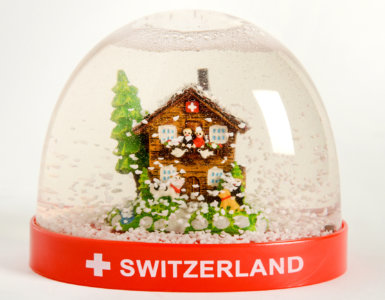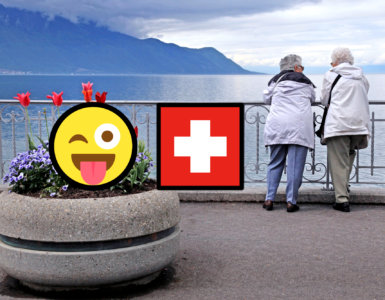Grüezi, Proscht und guet Nacht am Sächsi!
There are some essential Swiss German words you can use to let the locals know that you have done your homework. That's because the German language spoken in large parts of Switzerland is different from the German spoken in Germany.
For instance, you would buy a train ticket in Zürich by asking for a "Billett", not a "Fahrkarte." When used in the right context, certain Swiss German words can act as instant ice-breakers. They might put a smile on the faces of the Swiss who otherwise tend to be rather reserved. And then, there are some keywords that help you get to the bottom of Swiss culture. What's their train of thought, and what makes them ultimately tick?
Comprehend these Swiss German words to truly decode Swiss culture:
Bise and Föhn
[nouns]
Both are regional Swiss weather patterns, with Bise being a chilly wind and Föhn being a warm wind. As a rule of thumb, the Bise originates from north/east, and the Föhn from the south. But the point is that föhn-y air cools down as it creeps across a mountain range. At the top, it relieves itself from the moisture through snow or rain. Now lighter, the Föhn heats up by 1 degree Celsius for every 100 meters it sinks towards the valley on the other side.
The result is a high-pressure system with warm winds that feels just like a hair blower (which is the meaning of Föhn in Swiss German). If you understand this concept and praise the "Föhn" with the Swiss, you will surely make friends. At the same time, you could curse the Föhn because its high pressure will give you headaches.
As for the Bise, you better put on a coat because those winds will chill you to the bones!
Bünzli
[nouns]
Look for a single-family home with a perfectly manicured lawn and possibly even a garden gnome in the yard, and you might have just found yourself a Bünzli. This word describes the type of person who fully conforms to rules and ensures that everyone else does the same.
Do you know a coworker who always splits the tab down to the Rappen? He's a Bünzli. Or the neighbor who ties up her old newspapers for recycling in a perfectly rectangular fashion (and stacks them as if they were gold bars)? She's a Bünzli, too.
Do not get me wrong: having a Bünzli in your apartment building might have its benefits, too! Namely, never a car parked in the wrong spot because they have a special accreditation to issue parking tickets on behalf of the police. Never a loud party because they will call the police. And surely never a messy shared laundry room because that's the kingdom they rule.
Chuchichäschtli
[nouns]
I know, this one is quite a mouthful... Whenever a Swiss German gets asked about the most difficult to pronounce word in their language, the answer is Chuchichäschtli. Now, you might wonder what this magical word actually means. With all those scratchy, throaty, gutteral sounds, it cannot possibly be any good, right?
Kitchen cupboard! That's right - there is absolutely zero magic surrounding this Swiss German word. But it does have its own Wikipedia entry, which is not too bad for a boring storage cabinet...
Click here to rehearse the pronunciation, because knowing this word will surely win over your Swiss friends!
En Guete!
[expression]
Before starting to eat, it is very common to wish everyone a good meal. "En Guete" means as much as "have a good one". As simple as it may seem, it is an expression that connects Swiss Germans across age, income, and socioeconomic status.
In fact, it is not uncommon for complete strangers in a restaurant to wish each other "En Guete". Or if you walk along an office hallway during lunch hour, most everyone will greet you with this iconic Swiss German expression.
gäbig
[adjective]
No wonder the Swiss invented the Swiss Army knife: it's so gäbig! All the required tools are packed into one - how convenient!
I will go as far as to say that this little word is the common denominator among many Swiss inventions: the zipper (more convenient than buttons), those waterproof messenger bags from Freitag (very gäbig when it rains), and the idea that there is a tram stop right outside the airport in Zürich.
Drop this expression here and there to compliment your Swiss German friends when they show off something new. Knowing their Swiss way almost guarantees that the new hiking boots, side table, or laundry folding machine scores 100 percent on the gäbig scale!
Röschtigrabe
[noun]
Some might argue that this divisive word only exists in the minds of the Swiss. Others believe it is very much a reality. Either way, the meaning of Röstigraben quite literally translates to "hashbrown trench". No worries if you feel lost, there is an easy explanation for this...
The concept of Röstigraben is basically an imaginary line that crosses Switzerland along the German/French language barrier. It is not only a language separator but rather a cultural division, too. On one side, you have the Swiss Germans who enjoy eating Rösti potatoes. And on the other side, there are the Swiss French who pretend to despise it... Here is a visual of where this cultural trench is located (note the dividing line between green and orange).
Stellwerkstörig
[noun]
The Swiss value punctuality over everything. Alas, a train which is running late for mere minutes is unacceptable in their books. And so when an automated voice announces the cause of the delay to be a Stellwerkstörig, you will see: blank stares.
What it really means will remain a mystery, but it has to do with a blown fuse of sorts. In any case, this un-word was actually chosen as the word of 2013!
Uusziit
[noun]
The Swiss take at least one sabbatical in their lifetime. Because nothing beats an extended break to travel the world and leave everyday life in the rearview mirror!
An Uusziit is just that: it is time off, somewhere far away from the rat race. And it is a time when the remaining coworkers have to cover up for that lucky Swiss who's enjoying their Uusziit...
verhebe
[verb]
The authors at watson have correctly pointed out that there is no perfect English translation for the verb verhebe. The closest might be "to hold up", "to be airtight" or "to withstand". The Swiss use the word verhebe to describe something that will withstand external factors or challenges. It could also be a concept without holes in it.
Look around Switzerland and you will find lots of evidence of verhebe: the Swiss system of democracy has withstood global conflicts, houses are constructed to exist for centuries, and even park benches are solid. In short: it simply makes the Swiss feel good if their world verhebet!
And in case you were wondering about those terms in the introduction...
"Grüezi" is the Swiss German formal greeting. "Proscht" translates to "Cheers", and "guet Nacht am Sächsi!" basically means "good night at six o'clock!" I'll explain the meaning in another post because it would "de Rahme sprenge", or "burst the frame" of this article.





Add comment